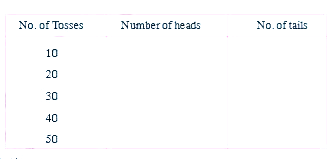Use the Factor Theorem to determine whether g (x) is factor of f(x) in each of the following cases:
(i)
(ii)
(iii)
(iv)
(v) Solution in Gujrati
The correct Answer is:(i) Yes (ii) Yes (iii) Yes (iv) Yes (v) Yes
Step by step video, text & image solution for Use the Factor Theorem to determine whether g (x) is factor of f(x) in each of the following cases: (i) f (x) = 5x ^(3) + x ^(2)-5x -1, g (x)=x +1 (ii) f (x) = x ^(3) + 3x ^(2) + 3x +1 , g(x) =x +1 (iii) f (x) =x ^(3) - 4x ^(2) +x + 6, g (x) =x -2 (iv) f (x) = 3x ^(3) - 20x + 12, g (x) = 3x -2 (v) f (x) = 4x ^(3) + 20 x ^(2) + 33 x +18, g (x) =2x +3 by Maths experts to help you in doubts & scoring excellent marks in Class 9 exams.
Updated on:21/07/2023Topper's Solved these Questions
- POLYNOMIALS AND FACTORISATION BOOK - NCERT GUJARATICHAPTER - POLYNOMIALS AND FACTORISATION EXERCISE - EXERCISE 2.5
17 Videos
- POLYNOMIALS AND FACTORISATION BOOK - NCERT GUJARATICHAPTER - POLYNOMIALS AND FACTORISATION EXERCISE - THINK DISCUSS AND WRITE
2 Videos
- POLYNOMIALS AND FACTORISATION BOOK - NCERT GUJARATICHAPTER - POLYNOMIALS AND FACTORISATION EXERCISE - EXERCISE 2.3
9 Videos
- LINES AND ANGLES BOOK - NCERT GUJARATICHAPTER - LINES AND ANGLES EXERCISE - THINK, DISCUSS AND WRITE
1 Videos
- PROBABILITY BOOK - NCERT GUJARATICHAPTER - PROBABILITY EXERCISE - DO THIS
3 Videos
Similar Questions
Use suitable idntities to find the following products
(i) (x+5)(x+2)
(ii) (x−5)(x−5)
(iii)(3x+3)(3x−2)
(iv)(x2+1x2)(x2−1x2)
(v) (1+x)(1+x)
View SolutionWhich of the following expressions are polynomias ? Which are not? Give reasons.
(i)4x2+5x−2
(ii) y2−8
(iii)5
(iv) 2x2+3x−5
(v) √3x2+5y
(vi1x+1(x≠0)
(vii)√x
(viii) 3 xyz
View SolutionFind the remainder when x3+3x2+3x+1 is divided by the following Linear polynomials:
(i) x+1
(ii) x−12
(iii) x
(iv) x+π
(v) 5+2x
View SolutionWhat is the difference between intersecting lines and concurrent lines ?
View SolutionToss a coin for number of times as shown in the table. And record your findings in the table.

What happens if you keep on increasing the number of tosses.
View Solutioncheck whether g(x) is a factor of f(x) or not f(x)=x5+3x4−x3−3x2+5x+15, g(x)=x+3
View Solutionगुणनखण्ड प्रमेय का प्रयोग कर ज्ञात कीजिए कि बहुपद g(x) बहुपद f(x) का गुणनखण्ड है अथवा नहीं।|
f(x)=x5+3x4−x3−3x2+5x+15,g(x)=x+3
View Solutionगुणनखंड प्रमेय का प्रयोग करके जाँचिये की g(x), बहुपद f(x) का गुणनखंड है या नहीं।
(i) f(x)=x3−6x2−19x+84, g(x)=x−7
(ii) f(x)=x3−3x2+4x−4, g(x)=x−2
(iii) f(x)=3x4+17x3+9x2−7x−10, g(x)=x+5
(iv) f(x)=2x3+4x+6, g(x)=x+1
View SolutionIf g(x)=x3+x−2 and g(f(x))=x3+3x2+4x then f(1)+f(2) is equal to ________
View SolutionUse the Factor Theorem to determine whether g(x) is factor of f(x) in each of the following cases :
f(x)=5x3+x2−5x−1,g(x)=x+1
View SolutionUse the Factor Theorem to determine whether g (x) is factor of f(x) in each of the following cases:
(i) f(x)=5x3+x2−5x−1,g(x)=x+1
(ii) f(x)=x3+3x2+3x+1,g(x)=x+1
(iii) f(x)=x3−4x2+x+6,g(x)=x−2
(iv) f(x)=3x3−20x+12,g(x)=3x−2
(v) f(x)=4x3+20x2+33x+18,g(x)=2x+3
View SolutionUse the Factor Theorem to determine whether g (x) is factor of f(x) in each of the following cases:
(i) f(x)=5x3+x2−5x−1,g(x)=x+1
(ii) f(x)=x3+3x2+3x+1,g(x)=x+1
(iii) f(x)=x3−4x2+x+6,g(x)=x−2
(iv) f(x)=3x3−20x+12,g(x)=3x−2
(v) f(x)=4x3+20x2+33x+18,g(x)=2x+3
View SolutionUse the Factor Theorem to determine whether g (x) is factor of f(x) in each of the following cases:
(i) f(x)=5x3+x2−5x−1,g(x)=x+1
(ii) f(x)=x3+3x2+3x+1,g(x)=x+1
(iii) f(x)=x3−4x2+x+6,g(x)=x−2
(iv) f(x)=3x3+x2−20x+12,g(x)=3x−2
(v) f(x)=4x3+20x2+33x+18,g(x)=2x+3
View Solutioncheck whether g(x) is a factor of f(x) or not f(x)=x5+3x4−x3−3x2+5x+15, g(x)=x+3
View Solutionनिश्चित कीजिए कि g(x) बहुपद f(x) के गुणनखंड है अथवा नहीं
f(x)=x3−3x2+4x−4 , g(x)=x−2
View Solution
